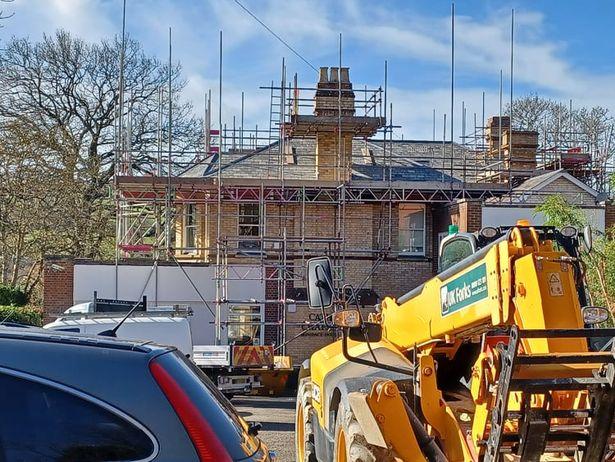Inside Exeter's 'traumatic' bomb blast zone one year on
This weekend marks the first anniversary since Exeter made international headlines following the discovery of a rare German World War II bomb that sparked a major evacuation and a controversial detonation that wrecked many homes.
Workmen in Glenthorne Road by Exeter University unexpectedly discovered a 2,200lb (1,000kg) bomb which was 2.55m long on February 26. Around 2,600 properties were evacuated, including 1,400 students from university premises.
The following day, a decision was made to detonate the bomb in Glenthorne Road rather than move it to a location where the blast would cause minimal disruption or destruction.
Read more:Utter heartbreak as Exeter graves ransacked
Despite hundreds of tonnes of sand and a special structure being built to contain the blast, many buildings nearby were badly damaged, and shrapnel was sent flying into nearby homes.
The Army later confirmed it had been unsafe to move the bomb and the controlled explosion was "not possible to prevent".
However, following concerns about the way the incident was handled and conflicting information being provided whether liability for damage was down to the developer of the site, the Home Office or individual insurance companies, Exeter MP Ben Bradshaw actively sought answers.
Both the Ministry of Defence and the Home Office have said a full post-incident report into how the bomb was dealt with in Exeter will be kept under wraps due to its 'sensitive and classified' content.
Liability for damage caused during the explosion has had to be met by private insurers, with no government fund to reimburse and compensate people affected by the damage.
It has resulted in some homes still being uninhabitable a year on from the detonation of the bomb, and others having endured months away from their homes while work was carried out.
To mark the first anniversary of the bomb blast, DevonLive has spoken to key people affected by the explosion and those who played a part in helping those caught up in the chaos.
The sad reality is that many lives have been traumatised by the incident and continue to be. A double blow for residents is daily life living with the building of Hill View Place - a gigantic block of student flats described as 'luxury student living'.
The long-term impact on homeowners is shared by the owners of a property very close to the detonation site.
Fiona Poolton had to wait nine months before she and her husband and their dog could return back to their home after being evacuated.
However, she says there are some residents who are still yet to return and even those who haven't even had work begin to repair their homes because of problems with their insurance companies.
Recalling the day they were evacuated, Fiona said: "It was really hard as it was during Covid, and I also work for the NHS. I had been out all day working and dog was at home.
"When I came back from work I was told I couldn't go into our house. I knew nothing about the bomb because I had been working at North Devon District Hospital.
"I was told I could quickly in to collect our dog and pack a bag. We thought we would just be gone overnight and were put up in a B&B."
Little did they know how long it would be until they could return to their home which was built around 20 years. They have owned it for about six-and-a-half years and had carried out extensive work to the property, including new windows and doors.
The bomb destination resulted in its roof sustaining 14 holes in it, every door and window was broken and damage was also caused internally. A snagging list still remains, including work to fix its patio.
What is happening where you live? Find out by adding your postcode or visit InYourArea here
Fiona, who finally moved back into the home last November, recalled: "The blast caused our roof to lift and come back down. Every room had damage to it.
"We have since lived in three different places because it was during Covid and we had our dog with us.
"A year on we still have things that need to be finished off. I have had to take time off to work out the house and due to stress. I'm now giving up my job in the NHS because of the stress I have been under.
"Luckily our insurer has been so good, but there is no insurance for the disruption to your life. The MoD has not taken any responsibility for it or for the stress it has caused and the ongoing stress.
"It has had an appalling impact on people's lives. We have had months of stuff going in and out of storage while trying to get on with our lives.
"We still have some neighbours who have not been able to move back into their properties, and for some people work hasn't even yet started because of problems with their insurance company. Although it is wonderful for us to be back it is like being on a building site.
"As well as suffering from bomb damage we are also having to contend with the constant upheaval of the building of the student block. Construction traffic is always coming up and down the road; it's crazy. The council should never have allowed planning permission. It just seems completely wrong.
"There is a lot of anger among residents from both the bomb damage and the student development."
The closest property to the bomb detonation was Dennyshill Care Home which has only recently reopened.
Care home residents were swiftly evacuated together at the Buckerell Lodge Hotel in Topsham Road after the bomb was discovered.
The home caters specifically for disabled people in their 80s and 90, including those with learning and physical disabilities such as cerebral palsy and Down syndrome.
The family-run business was home to seven residents who had been shielding since the start of the coronavirus pandemic.
It is owned by Tracey Hibberd who vehemently opposed the large students flats plan next door to its premises.
Support is still being offered by Exeter MP Ben Bradshaw who has valiantly striven to help local residents impacted by the bomb damage, and to try and seek answers over the handling of the bomb.
Mr Bradshaw said: “I feel huge sympathy for the residents who, on top of a global pandemic, have faced such distress and disruption following the World War II bomb detonation in Glenthorne Road a year ago.
"In the aftermath, some residents, including a care home, suffered significant building damage, some had to be temporarily rehoused, and some faced difficulties with their insurers over claims, and received no compensation from the Government.
"I was able to make progress for some constituents through contact with the Association of British Insurers and Financial Conduct Authority.
"However, despite repeated representations I made to the Government through parliamentary questions and letters to ministers, the Home Office refused to accept any liability for the damage caused, and after a helpful initial briefing from the Defence Secretary, the MoD declined to share their full incident report, and offered scant detail of the disposal operation that led to such a sizeable explosion and damage to people's homes.
"In contrast, Exeter City Council should be applauded for the way they stepped up so quickly to support residents with accommodation and expenses.
"I hope that life has returned to something like normal for residents in and around Glenthorne Road, however, if any residents are still encountering any difficulties or have unresolved insurance claims, they should feel free to contact me.”
The council leader says his thoughts are with residents who are still affected by the incident, some of who may still be dealing with insurance and other issues a year on.
He said: “When I look back on events a year on I am proud of the way in which all of the different agencies worked together to ensure everyone was kept safe, the device was made safe and people were cared for and supported in the aftermath.

“Our main role was as an emergency housing provider, and our team did a fantastic job in supporting people in very difficult circumstances.
You can stay up-to-date on the top news near you with DevonLive's FREE newsletters – find out more about our range of daily and weekly bulletins and sign up here or enter your email address at the top of the page.
“We supported residents who had to leave their homes before, during and after the blast with emergency accommodation, until they were allowed back to their homes.
“Other housing providers were also involved and did a fantastic job, as did the University and the County Council, and this was a real multi-agency approach.”
He added: “Our teams also helped to clear up the local area – sweeping roads and removing debris, and this extensive work continued for quite a long time.
“I hope that everyone affected by the incident has been able to get back to something like normality, and a year on our thoughts remain with them.”
Following the bomb detonation, 70 homes owned by housing association LiveWest were affected.
Some tenants were left waiting months for repairs to be complete and some have been told it will take until the spring for works to be completed.
There were significant amounts of glazed windows blown in all three blocks of flats owned by LiveWest within the detonated bomb area, with damage to UPVC frames and some internal damage to walls and radiators
Only recently has one tenant finally had his windows replaced. Lewis Pollard lives in a one-bedroom flat in a block of flats in Copplestone Drive.
His bedroom window was 'snapped in half' by the detonation, and he was then forced to live with a window that was covered over with chipboard and a layer of plasterboard.
It meant he had to endure it being freezing cold in the winter and boiling hot during the summer.
Lewis said: "All my windows were replaced recently. It’s much warmer and quieter now, and not pitch black.
"I believe one block is completed and Chilsedon house half completed. I am unsure about the third block.
"I don’t think construction on the site has been worth the hassle and inconvenience to so many people, especially with the noise that already comes from the university."
James Reseigh, director of Neighbourhoods for LiveWest, said: “We fully appreciate the impact this has had on our customers during the last 12 months.
“Our priority has been to support our affected customers and we have had a full-time customer liaison officer on-site keeping them fully updated and helping with specific needs.
“Due to supply chain shortages and raw materials and the availability of contractors throughout the pandemic, we had to increase the original estimated timescale to complete the extensive works to repair windows and doors.
“We have completed the majority of the repairs programme and expect all works to be finished during the spring.
“Our aim throughout the programme of works was to keep disruption to a minimum and we have made two payments to customers to cover any additional heating costs they may have incurred over the winter months.”
When Glenthorne Road was evacuated Alice Knight managed to leave with an overnight bag for herself, her husband and their daughter - and also their rabbit Flopsey in tow.
However, she had to leave behind her hamster due to its cage that she could not move and she was amazed to find it still alive after the bomb detonation.
The explosion caused damage to their roof which has since been replaced because it had 10 holes in it, vast cracks within their home and damage to their garden and garage. Two bedroom ceilings also had to be replaced.
Alice said: "We were one of the first people to get our roof done as our insurance company have been pretty good.
"Our daughter was about to turn 14 and is autistic so she found it very stressful being away from our home for 10 weeks.
"On the Monday after the detonation, I had to rescue my hamster because I couldn't wait any longer. I could see straight away we had holes in the roof and in the bedroom ceiling. Fortunately, the hamster was okay.
"I had never seen a hamster so happy to be up in the morning when I collected it and it was known as the bomb proof hamster after that.
"Sadly it died a couple of weeks ago but it was fine after the explosion.
"I know people who are still not back in their homes after the explosion and some people have moved on to different places and won't be coming back.
"After the explosion, I had two weeks off work as it was stressful. Initially, we stayed in a hotel as a home we could move into was not liveable to begin with.
"It felt a bit like being in the Blitz. It's sad as I think it has broken the community here in many ways, and the student development also hasn't helped."
Les Gilmer was a tenant in Cowley View but no longer is as he was forced to find alternative accommodation.
The property where he was living is still having work done to it a year later and he has since relocated to Manchester.
He had been planning to stay in Exeter for another year but says he was unable to find any other available properties in the area.
He said: "People have no idea what the devastation was. It really has to happen to you to get a full appreciation of it. My home was the second most damaged house.
"My opinion is it was a wrongful detonation. Apparently, it was moved on the site where it was found so why could they not move it and detonate it somewhere safer?
"At my property the front windows went, the French doors were blown out, there were cracks in the walls, the conservatory wall was blown out and the roof had holes in it. Debris was all over the place.
"That first night we were evacuated I had to sleep in my car as I was told by the police the council would contact me with accommodation but they didn't. It was in the thick of Covid so you couldn't just get a hotel room. I also had to sleep a second night in my car.
"Some insurance companies have been dragging their heels so it's just been a horrible, diabolical mess."
One of the closest homes to the detonation site is where Church of England curate the Reverend Ash Leighton Plom and his wife and son lived.
They were told the damage would take months to repair and they would need to move out for several months while major renovation work is done.
Their house, which is a church property belonging to the Diocese of Exeter, suffered damage to the roof, doors, windows and walls in the blast.
A year on and work is still being carried out at the property due to delays.
Revd Ash said: "We spent six months in temporary accommodation just outside the city, and have now moved to Heavitree.
"We're not moving back to the bomb site as repairs have taken too long. Some of our old neighbours have also moved out for good, but those who have moved back are not finding it a happy transition."







